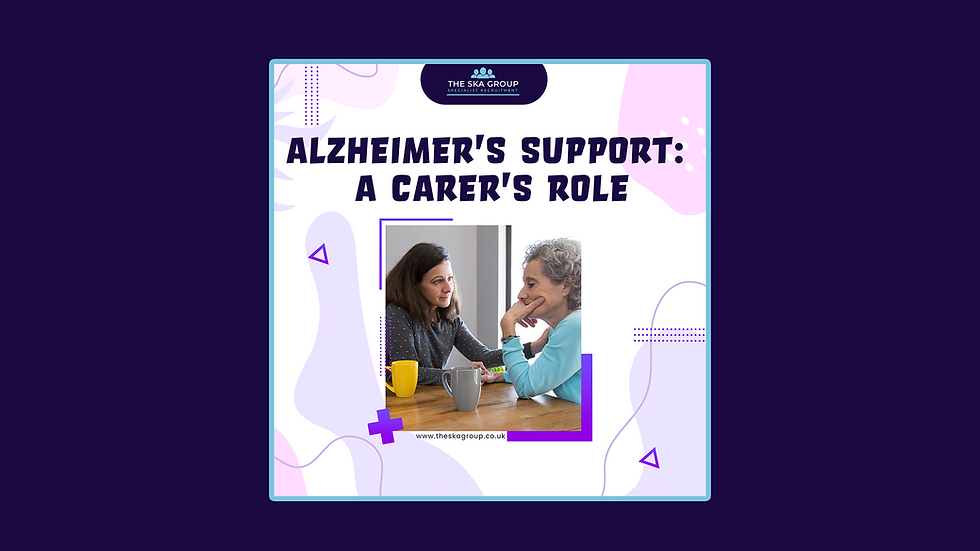Supporting Independence, Encouraging Autonomy
- Emily

- Jun 17, 2025
- 4 min read
Learning Disability Awareness Week is a time to celebrate strengths, amplify voices, and advocate for equal rights and inclusion.
One of the most empowering principles in supporting people with learning disabilities is the promotion of independence — not just in doing things for themselves, but in making informed decisions about their own lives.
At the heart of true person-centred care is choice and autonomy. It’s about supporting people to be the authors of their own stories. Too often, people with learning disabilities are not included in decisions that affect them — even when they are more than capable of understanding and contributing, given the right support.
This article explores why encouraging autonomy is essential, how it can be put into practice, and the positive impact it has on individuals and communities.
Why Independence and Autonomy Matter
Independence doesn’t mean doing everything alone. It means having control over one’s life — being supported to do things with others rather than having things done for them.
When people with learning disabilities are given space and support to make choices, the benefits are far-reaching:
Increased confidence and self-esteem
Greater sense of purpose and belonging
Improved mental and emotional wellbeing
Stronger life skills and resilience
Reduced feelings of helplessness or frustration
At its core, autonomy recognises that every person is the expert in their own life. Supporting that self-determination is fundamental to dignity and inclusion.
Putting Choice into Practice: What Autonomy Looks Like
Supporting choice doesn’t always mean grand, life-changing decisions. It often starts with the small things that make a person feel seen, heard, and in control.
Here are some practical and meaningful ways to embed autonomy into everyday care:
1. Listen
Everyone communicates — whether through words, signs, gestures, behaviours, or assistive technology. Taking time to understand someone’s communication style is the first step toward supporting their choices.
Rather than making assumptions, ask:
“What do you want to do today?”
“How do you feel about this?”
“Would you like to try it this way or that way?”
Being heard helps people feel valued and respected. It’s about co-creating the day, not directing it.
2. Offer Choices
Offering only one predetermined option isn’t truly a choice. Autonomy grows when people can select between meaningful, relevant alternatives.
Examples include:
Choosing what to wear
Deciding how to spend their afternoon
Selecting their own meals
Picking the music or film for the evening
3. Respect the Right to Take (Supported) Risks
It’s natural to want to protect people from harm. But overprotection can limit independence. Like anyone else, people with learning disabilities benefit from the chance to take healthy risks, try new things, and occasionally make mistakes — safely and with support.
For example, someone might want to:
Take public transport independently
Try a new activity like swimming or cooking
Speak at a local group or event
Move into supported living
With preparation and encouragement, these steps become opportunities for growth rather than danger.
4. Build Skills Gradually and Collaboratively
Fostering independence means helping people learn and grow — not by doing everything for them, but by offering support alongside them.
That might mean:
Breaking tasks into steps
Offering visual instructions
Using timers or checklists
Encouraging effort, not just outcomes
It may take longer, but the empowerment that comes from completing a task independently is always worth it.
5. Co-Create Support Plans and Life Decisions
True autonomy means having a say in your own care and future.
This includes:
Choosing support staff
Setting personal goals
Deciding on routines or timetables
Being involved in healthcare decisions
Accessible information — like easy-read documents, symbols, or videos — can help individuals understand their options and participate fully in their own planning.
The Role of Families and Support Workers
Families and care teams are instrumental in nurturing autonomy.
Supporting independence requires:
Trust – Believing in someone’s ability to grow and decide
Patience – Giving people time to try, fail, and try again
Creativity – Adapting tools and strategies to individual needs
Consistency – Reinforcing routines and encouragement
Importantly, support workers and families should be allies — not decision-makers. Ask yourself: “Am I helping this person to grow, or am I holding them back?”
Creating a Culture of Respect and Choice
Independence should be a culture, not a checkbox. Whether at home, in supported living, at school, or in the workplace, environments must value voice, choice, and inclusion.
This means:
Staff training on person-centred approaches
Open feedback channels for individuals and families
Regular reviews of support plans
A focus on strengths, not just needs
By building a culture where autonomy is encouraged and celebrated, we lay the foundation for more inclusive and empowered communities.
Final Thoughts: Empowerment Starts with Trust
This Learning Disability Awareness Week, let’s remember that inclusion is about more than access — it’s about agency. When people are given the right support, they are capable of making decisions, expressing preferences, and leading rich, meaningful lives.
Let’s move away from a system of “doing for” and embrace a model of “supporting with.” Every person deserves the dignity of choice and the opportunity to be in the driver’s seat of their own life.
Because with the right support, people with learning disabilities don’t just participate — they lead, they grow, and they thrive.




Comments